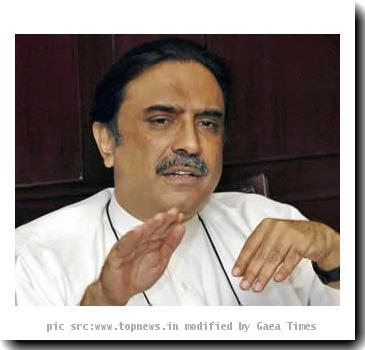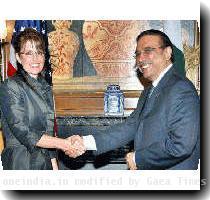Proposal to regulate media coverage stirs worries among Pakistani journalists
By Nahal Toosi, APThursday, July 1, 2010
Proposal stirs fears of Pakistani media censorship
ISLAMABAD — A government-backed proposal to limit Pakistani broadcasters’ terrorism coverage and criticism of the state is causing concern among journalists who fear it will stifle the country’s feisty, flourishing media.
A plethora of TV news networks have set up in recent years. Intensely competitive, they have not shied away from covering grisly aftermaths of suicide bombings, stories of government corruption, or allowing their talk show hosts to pontificate on air. That has fueled friction with some politicians, who say much of what is broadcast is exaggerated, false or irresponsible.
The regulations would curb certain types of images and reporting by broadcast outlets, including showing mutilated bodies or interviews with militant leaders. A copy of the proposal also includes a vague admonition against broadcasting “anything defamatory against the organs of the State.”
Violators could be punished by fines of up to 10 million rupees ($117,000) or prison terms up to three years.
The proposal has been vetted by a parliamentary committee and is expected to reach the full National Assembly later this summer.
“For us this is not a freedom of media issue. This is really more about responsibility, because it’s creating depression among the people of Pakistan,” said Farahnaz Ispahani, a committee member from the ruling party. “No civilized society, no civilized country in the world glorifies extremists and terrorists. Pakistan’s electronic media has not come up with their own code of conduct in this regard.”
It is uncommon for democratic countries to legislate sweeping bans on what the media can cover when it comes to terrorism, although Iraq has imposed vague rules that prohibit broadcast reports that cause “incitement of sectarianism,” said Joel Simon, executive director of the U.S.-based Committee to Protect Journalists.
Simon criticized the proposed Pakistani regulations, saying they “would have a devastating impact on … some of the most basic and essential coverage of events that are part of the news in Pakistan.”
Vincent Brossel, Asia director for the Paris-based Reporters Without Borders, said any regulation should more appropriately come from the media itself.
Top managers from Pakistan’s eight TV news channels agreed among themselves last year to standardize professional guidelines governing terrorism coverage. They decided they would desist from showing graphic and disturbing images on the screen and at times use a delay mechanism that would enable channels to edit out undesirable footage.
But that decision did not deter the parliamentary committee from seeking official regulations.
Ispahani, the committee member, declined to elaborate on the clause regarding the “organs of the state,” only saying it was “the product of a multiparty committee.” Other committee members could not immediately be reached for comment Thursday.
Pakistani journalists said it seems like a move toward state censorship.
“We have not seen even a draft of this so-called code of conduct for the electronic media,” said Pervez Shaukat, the head of the Pakistan Federal Union of Journalists. “We are not against a code of conduct for the electronic media, but all stake-holders should be taken into confidence.”
Mazhar Abbas, deputy director of news and current affairs at the ARY channel, said the proposal sounded “fishy.”
“The media will not accept any form of suppression from the government,” he said.
During Pakistan’s nearly 63-year history — much of it marked by military rule — the media have faced many attempts at censorship. Ironically, it was under ex-military ruler Pervez Musharraf that private broadcasters were allowed to take off.
In 2002, there was in effect only one TV outlet and one radio outlet — both state-owned, said Adnan Rehmat, executive director of Intermedia, a media support group in Pakistan. Now there are 92 Pakistani television channels, 26 of which are devoted to current affairs 24-7, he said. There also are around 130 radio stations.
Some sections of the Pakistani media have a combative relationship with the 2-year-old civilian government, especially President Asif Ali Zardari, routinely publishing or broadcasting disparaging reports and commentary.
Rehmat said aggressive coverage of the government has recently intensified because the military has managed to restrict journalists’ access to areas where it is fighting Taliban and al-Qaida insurgents.
Media have been especially focussed on confrontations between Pakistan’s executive branch and its judiciary that have provided plenty of fodder for reporters and opinionated talk show hosts.
“It’s unprecedented how vicious they’ve been, particularly television media, on the perceived clash of interests between the government and the judiciary,” Rehmat said. “They’ve gone from mere reporters to themselves becoming part of the story.”
Much of the coverage is critical of the U.S. as well, reflecting the pervasive anti-American sentiment across the country. Many talk show hosts lace their comments with conspiracy theories blaming unrest in the country on the CIA or the private security firm formerly known as Blackwater.
The odds appear high that the Parliament will pass the law, but it might have little impact, Rehmat said. The media have become too big to be reined in at this point, and Pakistan has a far better record of passing laws than enforcing them.
Rehmat also noted that Musharraf’s attempt to curb the media later in his tenure — he took private TV networks off the air for several weeks during a 2007 state of emergency — helped speed up his downfall the following year, something the current leadership may want to keep in mind.
____
Associated Press writer Sebastian Abbot contributed to this report.
(This version CORRECTS last name of Adnan Rehmat (instead of Rehman) in paragraph 18.)
Tags: Arts And Entertainment, Asia, Asif Ali Zardari, Government Regulations, Industry Regulation, Islamabad, Pakistan, South Asia, Television Programs, Terrorism, Tv News


